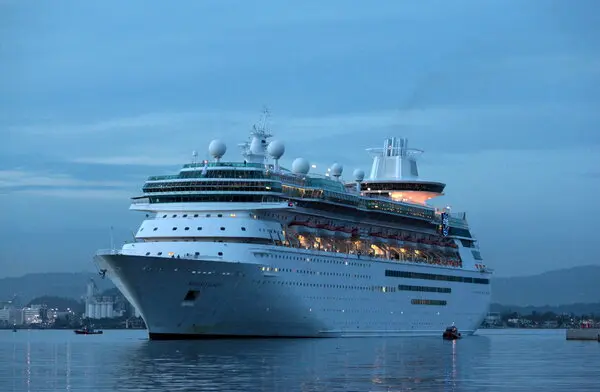A shocking incident unfolded off the coast of Puerto Rico when a cruise ship passenger, burdened with a staggering $16,000 gambling debt, jumped overboard in what officials describe as a desperate attempt to escape financial ruin. The event has sparked widespread debate about the dangers of gambling addiction, the psychological toll of debt, and the risks passengers take when faced with overwhelming personal crises at sea. This case is not only a headline-grabbing tragedy but also a sobering reminder of the hidden struggles individuals may carry even while vacationing on luxury cruises.
- The Incident in Detail
- Cruise Ship Gambling: A Double-Edged Sword
- The Weight of Gambling Debt
- Puerto Rico’s Role in the Investigation
- Psychological Struggles at Sea
- The Business of Cruise Ship Casinos
- Lessons from Similar Cases
- The Broader Crisis of Gambling Addiction
- Expert Recommendations for Prevention
- Impact on the Cruise Industry’s Reputation
- Public Reaction and Debate
- FAQs
- Who was the cruise passenger that jumped overboard in Puerto Rico?
- How much debt did the passenger accumulate before jumping?
- What steps did the cruise line take after the incident?
- Are cruise ship casinos regulated like land-based casinos?
- What resources are available for people struggling with gambling addiction?
- Could this tragedy lead to new regulations on cruise ship gambling?
- Conclusion
The focus keyword — Cruise Passenger in Puerto Rico Jumps Overboard to Escape $16,000 Gambling Debt — encapsulates the complexity of the situation: financial desperation, mental health struggles, and the broader responsibility of cruise lines to monitor at-risk behaviors. This story resonates globally as gambling addiction and personal debt rise sharply, especially in the post-pandemic era where economic uncertainty has left many vulnerable.
The Incident in Detail
Witnesses aboard the ship reported that the man, whose identity has not yet been disclosed by authorities, was seen behaving erratically near the ship’s casino prior to the incident. He had reportedly accumulated a $16,000 debt during the voyage, much of it lost in a span of just two days. According to passengers, he appeared agitated after leaving the casino late at night and was overheard telling a fellow traveler that he had “no way out.”
At approximately 2:30 a.m., surveillance cameras captured the passenger climbing over a railing and leaping into the dark waters below. Alarms were immediately sounded, prompting a full-scale man-overboard response. The ship’s crew launched lifeboats and coordinated with the U.S. Coast Guard, but after hours of searching, authorities suspended recovery efforts. The case has since been classified as a suspected suicide, though investigations remain ongoing.
Cruise Ship Gambling: A Double-Edged Sword
Cruise ships are often marketed as floating cities of entertainment, complete with casinos, nightclubs, and high-end dining. Gambling, in particular, is a lucrative business for cruise lines, generating billions annually. According to the Cruise Lines International Association (CLIA), onboard casinos account for nearly 15% of a cruise ship’s non-ticket revenue.
Yet, while casinos provide excitement and thrill for many passengers, they can also trigger destructive behaviors in vulnerable individuals. Experts note that unlike land-based casinos, cruise ship casinos create an environment where passengers are both isolated and encouraged to spend, with little oversight. “The combination of alcohol, limited distractions, and the illusion of vacation freedom creates the perfect storm for reckless gambling,” explains Dr. Alicia Morales, a psychologist specializing in gambling addiction.
The Weight of Gambling Debt
A $16,000 debt may not sound insurmountable to some, but to others it represents a devastating financial blow. The American Gaming Association estimates that nearly 2% of U.S. adults — around 6 million people — struggle with a gambling problem. For those affected, losses as small as a few thousand dollars can spiral into shame, secrecy, and desperation.
Debt-related distress can also have fatal consequences. The National Council on Problem Gambling reports that people with gambling disorders have suicide attempt rates up to 20 times higher than the general population. In this case, the cruise passenger’s leap into the sea is tragically consistent with that statistic.
Puerto Rico’s Role in the Investigation
Because the incident occurred in Puerto Rican waters, local authorities are working in coordination with the U.S. Coast Guard to piece together what happened. Officials boarded the ship after it docked in San Juan, interviewing passengers, casino staff, and crew members. Investigators are also reviewing financial transactions from the onboard casino to determine the exact nature of the debt.
Puerto Rico, which has a growing casino industry of its own, is familiar with gambling-related tragedies. Local experts have called for stricter regulations on cruise ship casinos, which operate in a unique jurisdictional gray area — often outside the reach of standard gaming laws.
Psychological Struggles at Sea
Mental health professionals emphasize that being on a cruise ship can intensify feelings of isolation. Unlike in a city environment, passengers cannot simply “walk away” from a casino or take time to decompress. Instead, they remain confined to the ship’s environment, which can heighten stress and impulsivity.
“Cruises amplify emotions,” says Dr. Steven Clarke, a marine psychologist. “People are in an enclosed space, away from familiar support systems, and often surrounded by temptations. For someone already vulnerable, it’s a pressure cooker.”
The Business of Cruise Ship Casinos
Cruise lines defend their casino operations as a form of entertainment, arguing that passengers gamble by choice. However, industry analysts acknowledge that casinos represent one of the most profitable amenities on board. Unlike ticket sales, which are often discounted to attract passengers, casino revenue provides consistent, high-margin profits.
Some consumer advocates argue that cruise companies should provide better safeguards, including self-exclusion programs, spending limits, and proactive monitoring of excessive losses. While some ships offer voluntary restrictions, enforcement is inconsistent, and few passengers are aware of such options.
Lessons from Similar Cases
This is not the first time a passenger has jumped overboard from a cruise ship under financial or emotional strain. In recent years, multiple incidents have highlighted the link between gambling losses and suicidal behavior at sea. For instance, in 2019, a British man reportedly leapt from a cruise ship after losing heavily in its onboard casino.
These cases underscore a broader issue: cruise lines often highlight the glamour of their casinos without adequately addressing the risks. Unlike in land-based casinos, where local laws may mandate responsible gambling measures, cruise ships often fall outside such requirements.
The Broader Crisis of Gambling Addiction
Globally, gambling addiction is on the rise. A 2023 study found that worldwide gambling revenue exceeded $540 billion, with online and in-person gaming both experiencing sharp increases. While most players gamble recreationally, an estimated 5% develop problematic habits.
Financial stress, relationship breakdowns, and even criminal activity are common consequences of gambling addiction. Tragically, suicide remains one of the most extreme outcomes, and incidents like the Puerto Rico cruise case highlight the urgent need for intervention.
Expert Recommendations for Prevention
Mental health advocates argue that cruise lines should adopt stronger preventative measures. Suggested steps include:
- Offering onboard counseling services for passengers in distress
- Providing clear information about gambling risks
- Training casino staff to identify signs of problem gambling
- Allowing passengers to set financial limits before playing
“The cruise industry must acknowledge its responsibility,” says Keith Whyte, executive director of the National Council on Problem Gambling. “Passengers should not be left to spiral unchecked in an environment designed to encourage spending.”
Impact on the Cruise Industry’s Reputation
Incidents like this can damage public trust in cruise lines, particularly as the industry works to rebuild after pandemic shutdowns. Safety has always been a central concern for passengers, but the concept of emotional safety is now gaining attention. Cruise companies are being urged to balance their pursuit of profits with their duty of care to passengers.
Public Reaction and Debate
Social media has been filled with a mix of shock, sympathy, and anger following the Puerto Rico tragedy. Some users expressed compassion for the man, noting that gambling debt can push people into despair. Others criticized the cruise industry for failing to intervene. A viral post by one passenger described the atmosphere in the casino as “predatory,” claiming staff encouraged players to continue gambling even after significant losses.
This debate raises an important question: should cruise ships be held accountable for gambling-related tragedies, or should responsibility fall solely on individual passengers?
FAQs
Who was the cruise passenger that jumped overboard in Puerto Rico?
Authorities have not yet released the passenger’s identity to respect the privacy of his family.
How much debt did the passenger accumulate before jumping?
Reports confirm that he had accumulated around $16,000 in gambling debt at the cruise ship’s casino.
What steps did the cruise line take after the incident?
The crew launched immediate rescue efforts, coordinating with the U.S. Coast Guard. Despite hours of searching, the passenger was not recovered.
Are cruise ship casinos regulated like land-based casinos?
Not fully. Cruise ship casinos often operate in international waters, which places them outside the jurisdiction of many gambling regulations.
What resources are available for people struggling with gambling addiction?
Organizations such as the National Council on Problem Gambling and Gamblers Anonymous offer hotlines, counseling, and support groups for individuals and families affected by gambling problems.
Could this tragedy lead to new regulations on cruise ship gambling?
Experts believe the incident may spark calls for stricter oversight, though cruise lines have historically resisted additional regulation.
Conclusion
The case of the cruise passenger in Puerto Rico who jumped overboard to escape a $16,000 gambling debt shines a harsh light on the hidden dangers of gambling addiction and the vulnerabilities of individuals at sea. While cruise ships are designed to provide fun and relaxation, the risks tied to onboard casinos cannot be ignored. This tragedy illustrates the urgent need for stronger safeguards, better mental health support, and greater accountability within the cruise industry.
At its heart, this story is about more than one man’s desperate decision — it is a wake-up call for society to take gambling addiction seriously. By recognizing the signs, offering support, and demanding responsible practices, both passengers and cruise lines can help ensure that future voyages do not end in despair.







